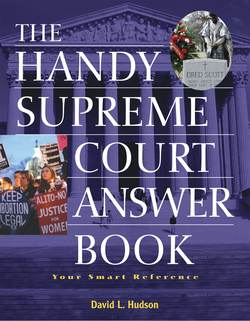Читать книгу The Handy Supreme Court Answer Book - David L Hudson - Страница 234
На сайте Литреса книга снята с продажи.
In what decision did the Marshall Court rule that the president has the ultimate authority to call out the militia and such orders cannot be reviewed by the judiciary?
ОглавлениеThe Marshall Court ruled unanimously in Martin v. Mott (1827) that Jacob Mott could not challenge his punishment for a court martial for refusing to join the militia when called during the War of 1812. Mott had been fined $96 and faced a one-year imprisonment. The Court, in an opinion written by Justice Joseph Story, said there could be no judicial review of the decision to call out the militia and determine whether it was the proper course of action. “While subordinate officers or soldiers are pausing to consider whether they ought to obey, or are scrupulously weighing the evidence of the facts upon which the commander in chief exercises the right to demand their services, the hostile enterprise may be accomplished without the means of resistance,” Story wrote.
CourtSpeak: Martin v. Mott Presidential Authority over Militia Case (1827)
Justice Joseph Story (unanimous): “Is the President the sole and exclusive judge whether the exigency has arisen, or is it to be considered as an open question, upon which every officer to whom the orders of the President are addressed, may decide for himself, and equally open to be contested by every militia-man who shall refuse to obey the orders of the President? We are all of opinion, that the authority to decide whether the exigency has arisen, belongs exclusively to the President, and that his decision is conclusive upon all other persons. We think that this construction necessarily results from the nature of the power itself, and from the manifest object contemplated by the act of Congress.”
